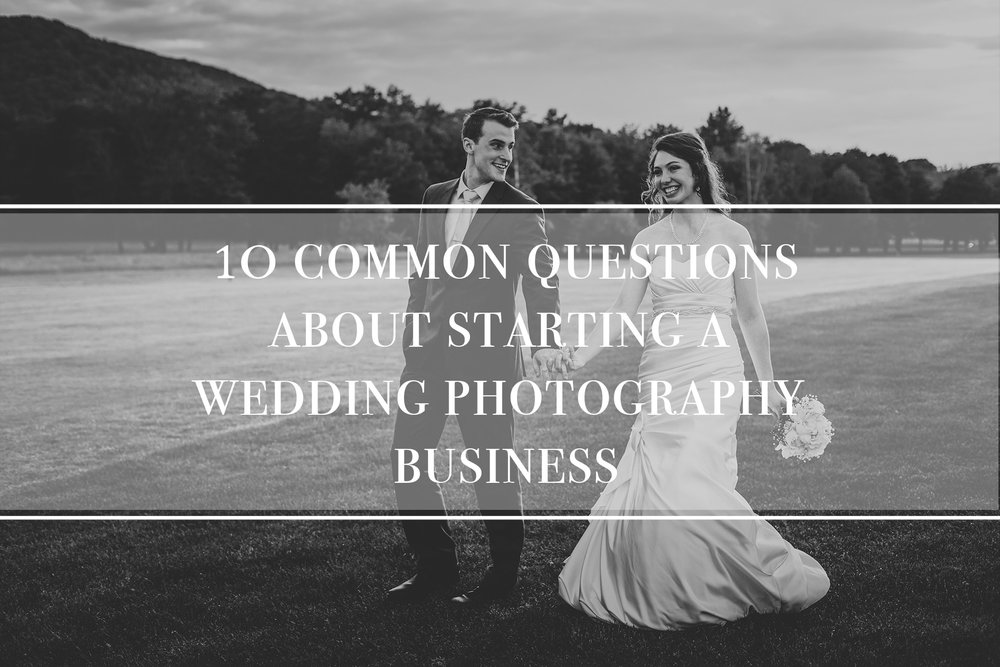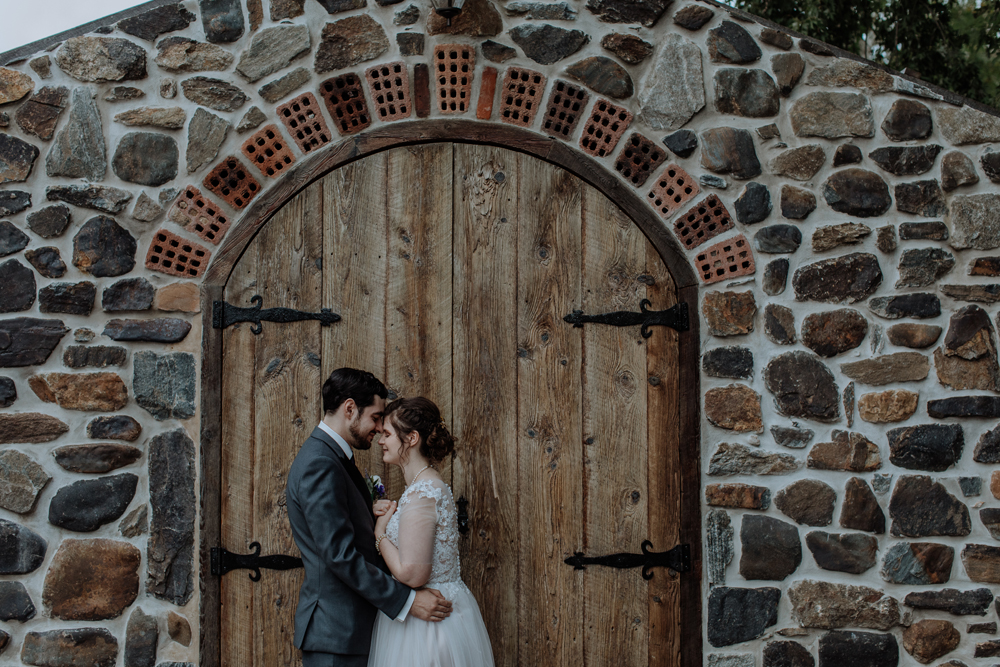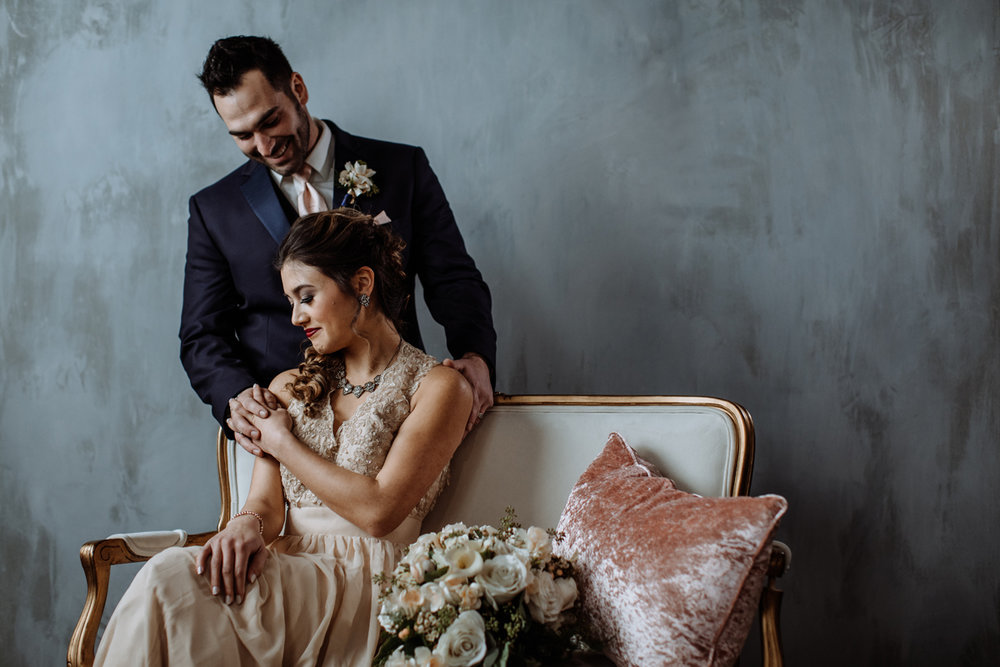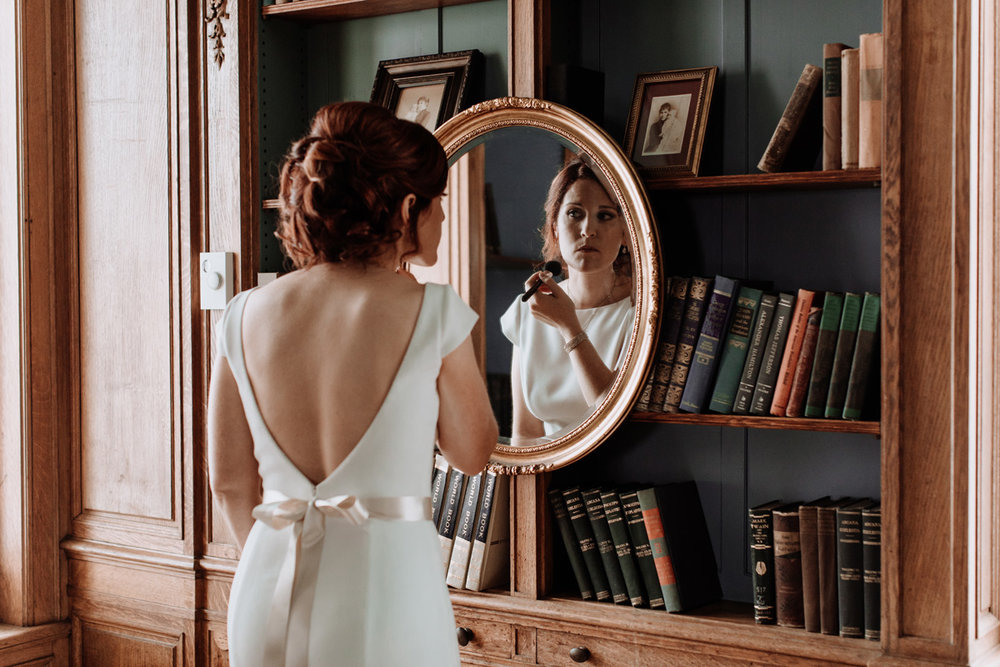
Starting a wedding photography business is a challenge to do right.
Let’s face it – if you do a quick search for wedding photographers, you are going to find a lot of results. After literally typing “wedding photographer” into Google, we get back almost 10 million results. When recently browsing through some recent likes on our Facebook & Instagram pages, we noticed that many of our latest followers are actually photographers themselves – working for their own photo studio.
In the world of business, photography has a pretty low barrier to entry. With new photographers arriving on the scene every day, it can be difficult to figure out how exactly to start your own wedding photography business – and have it be unique enough to not just survive, but thrive, while there is so much competition already out there.
For today’s article, we decided to look at 10 of the most common questions we have been asked (or have seen in online conversations) about starting a wedding photography business! It goes without saying, our responses are our own opinion, which have been shaped by actively growing and learning throughout our experience as a photography business ourselves. We will be providing honest perspectives on starting a wedding photography business, not just watered down half-truths to make you feel good.
10 Questions about Starting a Wedding Photography Business
1). How much money do I need to start a wedding photography business?
While every photography business may be unique in some ways, most have similar start up costs.
We highly recommend making a list of all the items you need and want, and calculate an estimated cost to give you a sense of how much money you will need to start your own wedding photography business.
One aspect of this question that is important to keep in mind is a follow up…what equipment/services do you need to invest in now vs. what stuff can you wait on.
When we started our own business, we did so by making smart investments into things that would help us develop quality images and superior customer service. These are both aspects of running a photography business that we continue to refine for sure, and this is made easier as we make more money with our business.
To give some rough estimates – we have around $2,000 in recurring costs paid each year in total (think: subscriptions to Honeybook, Microsoft Office 365, Adobe Suite, PhotoMechanic, PixieSet, insurance, etc.). In purchasing professional level camera gear, we’ve spent around $45,000 on equipment for two photographers. This includes camera bodies (with additionals as back ups), lenses, camera bags, lighting and flash setups, batteries, laptop, etc.
While not exactly cheap, at the start of your business, you should aim to have at least $10,o00 to put towards upgrading equipment and accessing recurring software services that will make your life much easier.
Related: 32 Detailed Tips for Starting a Photography Business
2). How do I find clients?
Probably one of the more difficult things when starting your own business is figuring out how to find clients that want to work with you.

In the context of wedding photography, your success is dependent on your customer service and portfolio. It is difficult to attract clients if you have no pictures to attract them with. Life gets a lot easier for beginning pro photographers once they have a few sessions + weddings under their belt, and in their portfolio (post them in blogs online).
The first piece of advice here is to do just that – get photography experience.
Photograph friends and family (more on that in a few).
While not for everyone, taking on unpaid or low paid gigs can help build your portfolio, too.
Additionally, reach out to other local photographers in your area, and ask to second shoot with them. We did this ourselves, and some of our portfolio of images come from weddings like this. Going this route to get started is not only beneficial to building up a wedding gallery for your website, but also a wonderful learning experience for you as an up-and-coming wedding photographer!
Aside from these initial clients – finding clients over time becomes a little easier, but requires some patience and testing of the waters in the context of advertising and social media use. One of the challenges you will face as you grow your wedding photography business is figuring out how to attract your ideal client – which is hugely different than having many inquiries for weddings you don’t want to shoot at face value, or with deep budget restrictions that do not align with your pricing.
Related: How to Book Your First Clients Without Spending Money
On social media, advertising (both free and paid) can be valuable. On Facebook, you can target posts/ads to specific audiences if you like (such as women, aged 18-40, who are recently engaged…). The opportunities there if done correctly are pretty significant, but getting good reach and visibility costs money. On Instagram or Twitter, making use of relevant hashtags is essential (we get many inquiries this way). The main thing with social media is that you get more from it as you put more into it.
An extra tip – using a social media scheduler to plan posts in advance helps significantly. We recommend using Later as it has an unlimited free option, as well as paid upgrades that actually seem worth it once you have some extra money to spend on the convenience this brings. We like to schedule at least a months worth of posts at a time, so we can spend less time figuring out what to post about day-to-day.
A last note on finding clients…the wedding industry, while pretty to check out on social media and various websites around the net, exists heavily in the “real world” for vendors. The number of referrals we receive from people we’ve befriended in the industry are incredible, and we value these relationships heavily. It takes time to get to this point, no doubt, but know that over time as you get involved in the industry – there is a lot of potential for referral leads + paying it forward to others when you can’t take on a wedding due to already being booked yourself (as we do).
Going hand-in-hand with finding clients, having a good marketing plan will help you grow your wedding photography business. If you’d like some of our thoughts on this, check out our article: 11 Ways to Market Your Wedding Photography Business
3). How do I do the accounting?
If you have to ask, you should probably take a class or hire someone. Just kidding! Well…sort of.
Accounting is not always simple, learning tax law is not easy, and trying to figure out as the year goes on how much money you’ll end up having to pay in income taxes is a royal pain. As we’ve learned, it’s also sort of terrifying come tax season. But, this whole process is hugely important when it comes to running a business. Writing off expenses for supplies, camera gear, mileage, etc. adds up to substantial savings. And while no one likes it, paying taxes is a part of our civic duty as a registered business.
When it comes to accounting, you should ultimately consult an accountant for info if you are totally clueless. But, we can give some basic accounting tips based on our own experiences with it (remember: we’re photographers who happen to have to do accounting, not accountants who photograph for a hobby). So ultimately, it is well worth investing in an accountant who knows their stuff when it comes time for the nitty-gritty &it is incredibly helpful for those hard to figure out questions!
We value our accountant more than anything in this business aspect.
With that out of the way, there are programs out there that can help streamline this process such as Quickbooks, but it is costly at around $400/year. Alternatively, you could utilize Excel with an accounting template, and work from there. Fortunately for us, Chris’ day job requires much use of Microsoft Excel, so he has been able to adapt an accounting spreadsheet to meet our business needs on his own.
While whole books are written on this topic, a few small pieces of advice when starting off:
- Get a business bank account + credit card, and only make business purchases with these – this creates an auditable trail that is tied to your business, and not intermingling personal purchases with business purchases.
- Many things you wouldn’t even expect are tax deductible, so be sure to log them. Big purchases are especially important. When you buy thousands of dollars in camera equipment, the tax savings can be significant.
- Log everything in detail – include receipts, invoice #’s, dates, etc.
- Invest in MileIQ – we tried keeping a mileage log by hand, and it is the biggest waste of time and energy. MileIQ is an app you can set up to automatically log your driving. You can go on the app (or online), and select whether the drives were for personal or business purposes. It works really well, and only costs $60 a year. In 2017, we logged over $2,000 in business driving expenses we could write off our taxes. It’s one of the few services that pays for itself. If you use this link, you can get 20% off your first year!
Want more info on MileIQ? Check out our article: The Perks of Using MileIQ for Your Photography Business
4). Do I really need business insurance?
The short answer is: YES.
Having insurance protects you in the event something would go totally wrong.
There is coverage to both cover your gear (General Liability Insurance) and your work (Professional Liability Insurance). The latter of these is definitely needed, in some cases venues won’t even allow you to work without it. As for covering your photography gear, this is ultimately more up to you, but for a few dollars a month we cover tens of thousands of dollars of equipment in case we would drop and break something, or have things stolen when we aren’t looking.
Just like with car insurance, we hope we never have to use the insurance. But, it is in place in the event that we did have to use it, and we are glad for this. We personally use Hiscox, and it seems reasonably priced, and their customer service has been good in the instances where we have needed things such as document updates from them.
5). How much should I charge?
This can definitely be a tough one!
Pricing your wedding photography service requires experimentation based on data. That actually sounds really nerdy, but it’s the truth!!

One of the best metrics freely available to you is to check out a bunch of photographers in your area. How much are they charging? And more importantly…what are they offering at their different price points?
We’ve seen many photographers who can charge $5,000 for a wedding day service, but when you look at the package it sometimes includes a lot of extras (that could be costly to the business) such as: engagement session, waived travel costs, a nice quality photo album, print credit, etc. When looking at these figures, try to figure how much other photographers actually make to better pinpoint what your pricing should be. You can feel free to check out our wedding day package pricing for a start, since we have it clearly laid out on our website already.
With that said, decide what you want to include in your packages. From there, when you are just beginning, you may want to charge a bit under other photographers in your area. This is a double edged sword as it can sometimes attract “budget brides” who may not care so much for photography, but rather getting a deal on wedding photography. This may work for some, but only you can make the call if this is an approach you’d like to take!
Additionally, you should do the math to determine how much money you need to make sure you are not living in a cardboard box and can cover business expenses. For us, since we work full time jobs separately from our wedding photography business right now, it is easier to handle pricing as we have steady incomes otherwise. Our goal is to be able to price ourselves so we can both do photography full time one day, so our pricing is designed to help us reach income replacement at some point.
6). Should I have contracts?
YES! A million times, YES. Any time you do work professionally, you will want a contract in place. You can find templates online to start with, or if you are very unsure, contact a lawyer and have them create custom contracts for you. Yes, this will cost money – but it may spare you headache in the future if ever you have to fall back on what is being contractually agreed upon. Like business insurance, contracts are in place in case something would happen that that would be unexpected or unwanted.
While in no way comprehensive, some things you will want your contract to highlight include:
- Service costs (what is the total service cost? What is the deposit fee?)
- Any additional fees that may arise (think: travel or admission fees day of a session)
- Cancellation policy
- Turnaround time to deliver photos after wedding
- What happens if there is really bad weather, death in the family, emergency?
- Do you require a meal at the wedding?
For sending contracts to our clients, we use Honeybook and highly recommend it. You can get 50% off your first year subscription (a $200 value) if you sign up using this link.
7). Should I set up as a Limited Liability Company (LLC)?
Once you start shooting weddings “as a business,” you default to operating as a Sole Proprietorship. This is basically the simplest type of business – just one person doing business as themselves (usually). If you only want to shoot a small number of weddings or other types of sessions a year, this may be fine, but if you are looking to expand into a more legitimate business – you will want to incorporate. You will want to look into the different business types, and decide which one suits you best. For your average photographer, setting up as an LLC makes perfect sense – though some might wish to become an S-Corp or Corporation depending on their circumstances.
For Hand and Arrow, we decided to set up as an LLC for a few main reasons. The first and most important to us is that by operating as a LLC, our personal assets cannot be sued for (in most cases) if we were to be sued for something our business has done. Again, this is another case where we’d like to think we’d never be sued, but setting up as a legitimate legal business helps create separation between yourself as a person and your work as a business. Speaking of separation, by operating as an LLC, it allows you to distinctly show the government your business is separate from your personal finances. This further enables setting up business bank accounts and accounting for sales/expenses as a business totally separate from your personal funds and purchases. This is really essential.
8). Should I give discounts or gift wedding photography to friends/family?
We’ve seen so much discussion on this question, and for good reason. A lot of times photographers will be asked by friends or family to take pictures – sometimes for big events like a wedding. As a general rule of thumb, it is not a good idea to give discounts or gift photography services unless it is something you want to do. If you feel coerced or unprepared to deal with the responsibilities shooting a wedding comes with, don’t do it. If you are currently charging $3,000 to shoot a wedding and don’t want to shoot a friends for free, don’t do it. In some situations, friends and family may not know the actual value attributed to your work (it happens), but it is not mandatory that you devalue yourself for their sake – unless it is something you truly and wholeheartedly want to gift.
In our case, the best example we have of offering wedding photography as a gift was to Chris’ cousin. It was low pressure photography for someone we consider one of our best friends, and we used to rent a house together back in the day. We gifted photography because we truly wanted to, not because it was explicitly asked for. In our case, shooting this wedding also benefited us in allowing us to build our portfolio at an early stage where we had few weddings in the bag. It was a wonderful experience as we also got to be guests and celebrate with them and our friends and family during the day. So it really didn’t feel like work! But at the end of the day, if you know this is something the couple you are wanting to gift your services to will wholeheartedly cherish and be grateful for forever, well then you’ve got your answer.
9). How much time do I need to dedicate to running my business?

It depends what you want to get out of your business. For us, growing our wedding photography business requires much time and effort. Every week for the past year (minus our 10 day trip to Iceland) we have clocked 80+ hour work weeks between our day jobs + working on our photography business. Most work days, we spend at least 4 or so hours on Hand and Arrow – talking with clients, editing our website, writing content, working on social media and marketing, taking and editing photos, etc. On the weekends, we can easily work 10+ hours a day on H&A between weddings and sessions.
During the high season (September and October for us), we basically work around the clock. It is actually painful at times – shooting weddings on the weekend, and culling/editing all week. No doubt, it would be easier without full time day jobs – but it comes with the territory, and we like the challenge.
The most basic advice we can give you is this: if you want to run a full time business, you need to put a lot of time and energy into making that a reality.
With that said, set realistic goals along the way that you can achieve. These can be financial (so…sales goals), or internal (like…”I’m going to update my website About page”), or something customer facing (such as…”I’m going to figure out a way to make my customer’s LOVE the experience of working with me”). Set these goals and work to achieve them one-by-one. From there, also learn how to have a work-life balance early on. It is critical you do so!!
10). What camera and lenses do I need?
Let’s face it…asking about photography equipment such as camera bodies and lenses is sort of a loaded question. If you want to be a professional wedding photographer, you need to have gear that is professional level. What this means for you or someone else will likely vary, though. Like everything else in this post, our thoughts on camera gear and lenses stems from our personal experience – and we only recommend equipment that we use.
here are our basic recommendations for what we consider essential camera + lens basics
But first…a disclaimer. In the following segment, you will find information about essential camera + lens equipment. Contained herein are affiliate links to Amazon. Anything purchased through these links will provide us a commission. If you are considering making purchases and find the information provided in this article to be useful, please consider using these links as it allows us to continue creating great content like this.
CAMERA BODIES:
Canon 5D Mark III – Review
Canon 5D Mark IV – Review
Both of these camera bodies are widely considered some of the best for professional photographers, and are commonly used by wedding photographers. While the Canon 5D Mark IV is superior in many respects (such as low light performance), the Canon 5D Mark III still remains an excellent choice as well – especially to those who are more budget conscious – and more specifically considering that it is around $1,000 less expensive. In our photography kit, we use Canon 5D Mark IV’s as our primary camera bodies, and have Mark III’s as backups.
CAMERA LENSES:
Canon EF 50mm f/1.2 L USM Lens – Review
Canon EF 70-200mm f/2.8L IS II USM Telephoto Zoom Lens – Review
Canon 135mm f/2 Camera Lens – Review
Canon 85mm f/1.2 II Camera Lens – Review
Canon EF 24mm f/1.4L II Camera Lens – Review
All of the above lenses are what we would consider as essential for beginning wedding photographers. With these lenses, you will have a lot of options for capturing the moments you need to capture – with a range of focal lengths that serve the purpose of capturing smaller details and intimate moments, as well as wider environment shots. We do use some other lenses as well, but consider them to be secondary in terms of what is needed when you start your business. We discuss these 5 lenses in more depth in our article: The First Canon Lenses You Should Buy for Wedding Photography.
Your questions, answered…
Today we looked at 10 of the most common questions we have been asked (or have seen in online conversations) about starting a wedding photography business. We have heard these questions on so many occasions, that we felt it would be useful to put our own thoughts down and share with other photographers likely asking some (or all) of these questions themselves. Starting a wedding photography business has both simple and complex elements to it, and can be quite a challenge if you are unprepared to handle all of the responsibility that comes along with it. BUT!! It is SO worth it! When prepared for, and done right, running you’re own wedding photography business can be rewarding for you & all the couples you come to serve. In our experience, it’s worth the stress and investment, and we hope you benefit from our thoughts in this article!